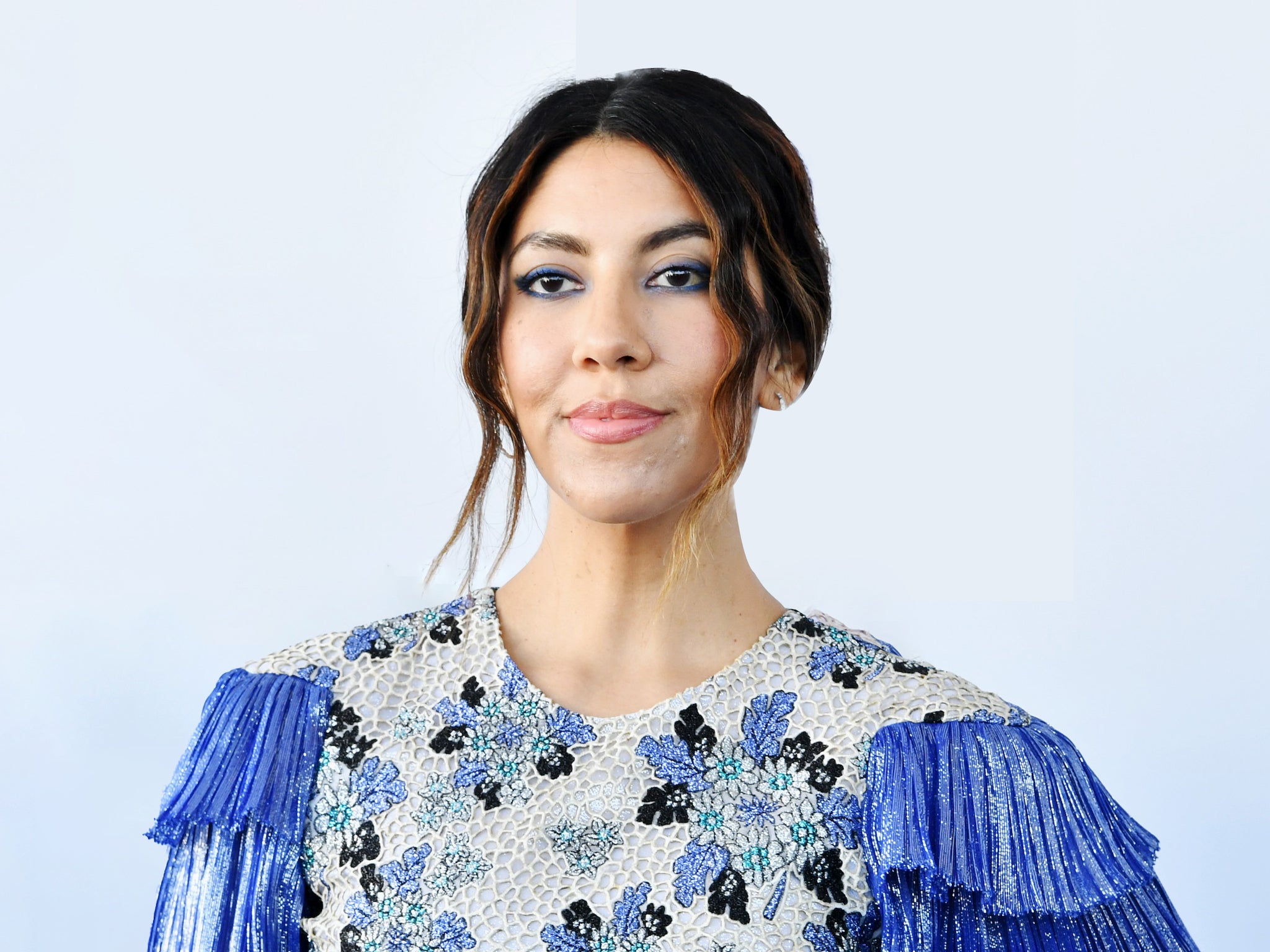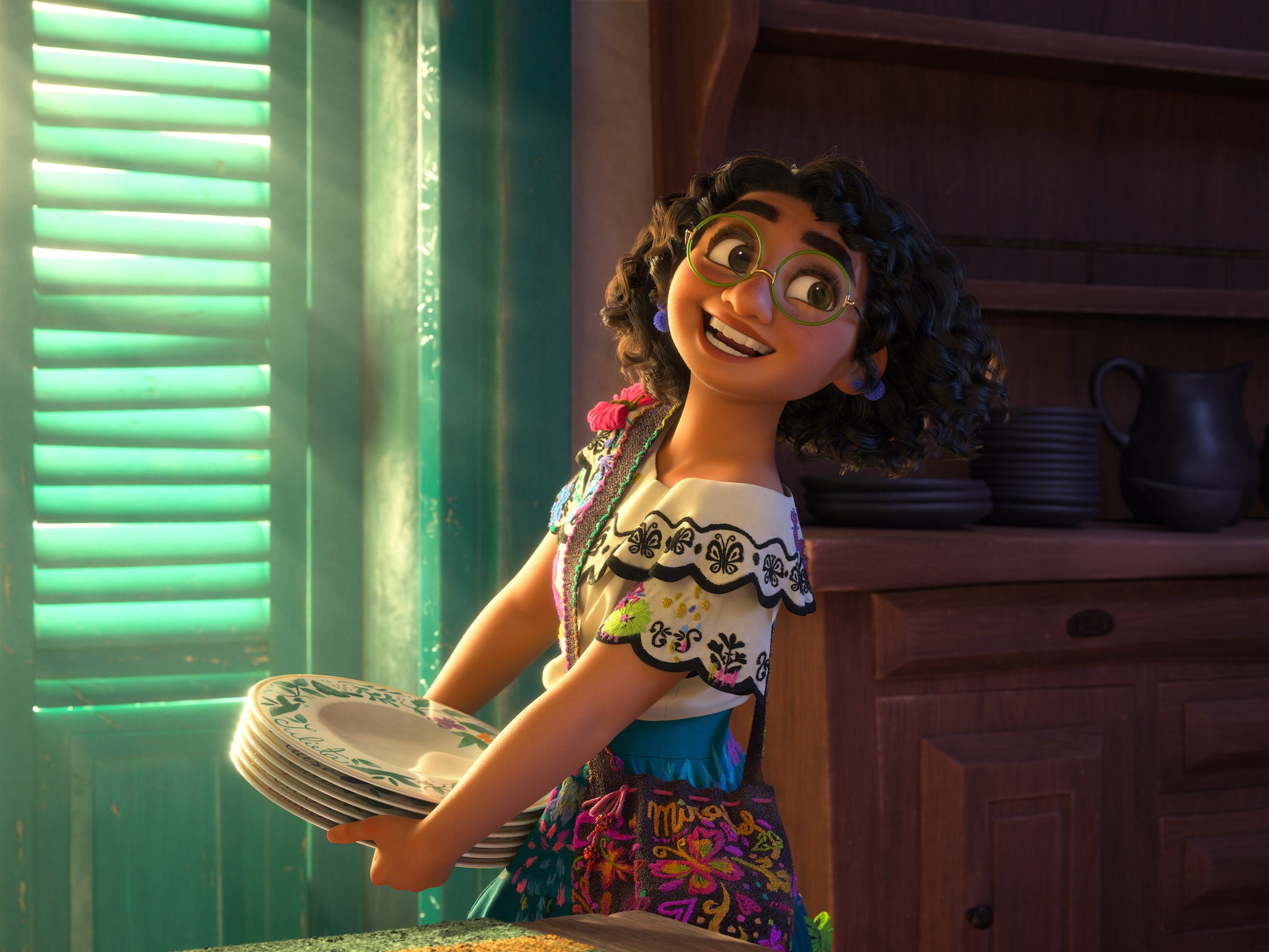Stephanie Beatriz: ‘Bisexuals are so often presented to be super promiscuous’
The ‘Brooklyn Nine-Nine’ actor has hung up her handcuffs to play a magical teen in new animation ‘Encanto’. She talks to Annabel Nugent about queering telly, her struggle with typecasting and playing the Disney princess she never saw herself to be when growing up


Your support helps us to tell the story
From reproductive rights to climate change to Big Tech, The Independent is on the ground when the story is developing. Whether it's investigating the financials of Elon Musk's pro-Trump PAC or producing our latest documentary, 'The A Word', which shines a light on the American women fighting for reproductive rights, we know how important it is to parse out the facts from the messaging.
At such a critical moment in US history, we need reporters on the ground. Your donation allows us to keep sending journalists to speak to both sides of the story.
The Independent is trusted by Americans across the entire political spectrum. And unlike many other quality news outlets, we choose not to lock Americans out of our reporting and analysis with paywalls. We believe quality journalism should be available to everyone, paid for by those who can afford it.
Your support makes all the difference.Stephanie Beatriz is all smiles today. The actor speaks with her hands. Her shoulders too. They bob along as she nods her head up and down, side to side. She makes use of her body in conversation, even over Zoom, eyebrows arching at varying degrees like a barometer of excitement. It’s strange to see Beatriz so effusive. The 40-year-old American is not known for being expressive. Actually, that’s inaccurate. She is known for one expression: deadpan.
That stoniness belongs solely to Rosa Diaz, Beatriz’s character in Brooklyn Nine-Nine and the role she is most known for. The cop sitcom, which stars Andy Samberg and Terry Crews, has amassed awards and an enormous fanbase, a large portion of which worship Beatriz’s no-nonsense detective, Rosa, who had anger management issues and a fondness for leather jackets. Across the show’s eight seasons, her unlikeable character became totally beloved. But Beatriz cuts a different figure in her latest release, Encanto. For one thing, she’s a cartoon.
The Disney film – out in cinemas now – tells the story of the Madrigals, a magical family living in a town deep in the Colombian mountains. They’ve each been bestowed a unique gift, such as super strength or controlling the weather. Beatriz voices Mirabel, our bespectacled, big-hearted 16-year-old protagonist – and the only Madrigal not to be blessed with a power. When she realises her family’s magic is dying, though, Mirabel is the only one who can save it.
So far, so Disney fairytale – but Encanto is a rip-roaring delight. It’s a lushly animated quest fable brimming with big musical numbers, courtesy of the omnipresent Lin-Manuel Miranda. In line with the studio’s progressive princesses as of late, Mirabel has no love interest and looks like an actual adolescent girl as opposed to an impossibly proportioned Barbie doll. Her family runs the gamut of body types, skin tones and hair colours.
It’s a joy to see representation like this. Especially for Beatriz, who grew up on a diet of Disney princesses who looked nothing like her: blonde haired, blue-eyed, rosy-cheeked royals, each more wasp-waisted than the last. “You and I both know that not everyone looks like that,” she says, gesturing through the camera with an open palm at my hair, the same inky black as hers. “And we know that beauty shouldn’t be held to that standard – but trying telling a seven-year-old that!”
It hurt, she says, to identify so deeply with heroines like Belle and Cinderella (“I knew what it felt to feel those feelings they were expressing through song”) but to believe she would never be one. “I guess to be the centre of the story, you’ve got to look a certain way. You have to be a certain type of person,” she remembers thinking.
Beatriz, whose mother is Bolivian and father is Colombian, was born in Neuquén, Argentina. “My dad’s job had us moving around a lot,” says the actor. Together they emigrated to Texas aged two. She was young enough when they moved that she feels “deeply, deeply American”, and grew up in a two-bedroom apartment right outside of Houston. Beyond those four walls, however, was an enclave of Latin culture that reminded her of where she came from. “My mom was really young when we moved here,” Beatriz says. “She missed her family and so she created a chosen family in our town of Webster. Not just Latinos but all of these people who had emigrated to the United States.” At school, she found another family in drama club. “I felt like there was a place for me there.” (She’ll once again tread the boards next month, making her London West End debut in the Gielgud Theatre’s production of 2:22: A Ghost Story.)
After graduation, Beatriz took a theatre degree at Stephens College in Missouri and then moved to New York. Her parents were wary about her career choice. “It’s very risky pursuing the arts, especially if you don’t know anyone who has done it before. It’s really unknown,” she says. “I didn’t know how people got on TV or in a play. There was no one in my family who could tell me how to get an agent.” She scrunches her nose in mock confusion and widens her eyes. “Like, what’s an agent?”

She found out eventually, and landed a couple of bit parts on TV. Earlier in her career, Beatriz accepted parts that she wouldn’t even glance at today – superficial characters in underwritten scripts that treated her skin colour as a springboard for stereotypes. “We got to eat,” she says now. “We got to pay our rent. We got to have health insurance, so yeah, I did those parts.”

Watch Apple TV+ free for 7 days
New subscribers only. £8.99/mo. after free trial. Plan auto-renews until cancelled

Watch Apple TV+ free for 7 days
New subscribers only. £8.99/mo. after free trial. Plan auto-renews until cancelled
Better roles followed, including as the bitterly jealous sister of Sofia Vergara’s character, Gloria, on the hit sitcom Modern Family and a notable turn opposite Brie Larson in the tiny but acclaimed 2013 indie film Short Term 12. But it wasn’t until Brooklyn Nine-Nine that Beatriz reached strangers-approaching-you levels of fame, and her recent part in Lin Manuel Miranda’s acclaimed musical film In The Heights was more fuel in the engine.
These days, people will stop her in the street for a photo and demand that she “do the Rosa thing” – the bitchy face, the snarl. Beatriz doesn’t mind so much, but it’d be nice for it to be a request as opposed to a command. “I like to offer it if a fan comes up to me,” she says. “I ask if they want to take an angry photo, if that would satisfy their needs.”
More than anything, Beatriz wants to connect with her viewers. It’s why, unlike other actors wanting to break free of what came before, she’s happy to be thought of as Rosa forever. “What a gift to have created somebody that feels so real to people.” Rosa’s strongest connection with audiences arrived in season five, when the character came out as bisexual. True to form, it was a brusque two sentences: “I’m dating a woman. I’m bi.”

The TV moment came a year after Beatriz herself came out as bisexual. In a 2016 tweet, the actor wrote “Yup” alongside an interview with Aubrey Plaza headlined: “I fall in love with girls and guys. I can’t help it.” Shortly after her Twitter revelation, Brooklyn Nine-Nine’s co-creater Daniel Goor asked her if she’d be comfortable with a bi storyline for Rosa, who had long given off “queer vibes” anyway. Together they worked on a two-episode arc that would feel authentic to the character and, more importantly, to any queer people watching.
There were certain things Beatriz made sure to include. Namely, the actual word. “It was important to me that ‘bisexual’ was said because I grew up in a time where it wasn’t heard often,” she says. The storyline follows Rosa as she struggles to come out to her parents, and then struggles with their reaction. Beatriz didn’t have a singular coming-out moment with her own family. “It came out in little piecemeal things,” she says.
Brooklyn Nine-Nine was a big part of it. After the episode aired, Beatriz gave an interview in which she was asked whether her parents had seen it. “I said, ‘I think they have but they haven’t spoken to me about it so I don’t know how they feel.’” Later that day, her dad must’ve seen the article because he texted her (“I don’t think he could handle a phone call”). He wrote: “We’re proud of you and we love you no matter what.” Beatriz gets a little misty-eyed speaking about it now.
It hasn’t always been easy, though. “I’m in that intersection of Latinx, woman and queer, and there’s a lot of cultural norms you feel pressured to complete, like get married, have kids…” She trails off before picking up the thread again. “As a bisexual woman, people think like ‘Oh you could still fall in love with a man and do all those things.’ People think it’s a phase or that it’s not even real.”
She adds that “really important media” is partly to blame for these myths. Sex and the City stung the worst. “It sucked watching one of my favourite shows talk about bisexuality in this super shitty way for jokes. It felt yuck.” In season three, Carrie et al conclude that bisexuality is a “layover to Gaytown”. Beatriz’s face distorts into a fake gag. This was a show that spoke openly about rimming, masturbation and anal sex – and still it couldn’t come to grips with bisexuality as a legitimate identity.
Beatriz is proud to have been part of a show that did better. Still, representations like Rosa in Brooklyn Nine-Nine are few and far between. “We’re so often presented to be like these super-promiscuous beings. Like we’re using our sexuality to manipulate people.” She rolls her eyes and pauses for a moment, then exhales and her face relaxes into a content grin. “It’s like nah, I’m just living my life.”
Encanto is in cinemas now and available to watch on Disney Plus on 24 December



Join our commenting forum
Join thought-provoking conversations, follow other Independent readers and see their replies
Comments